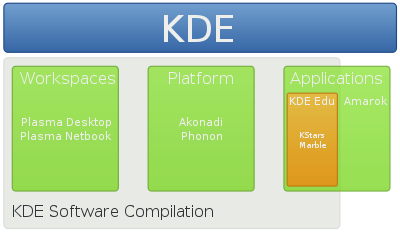KDE Platform 4
 | |
| Original author(s) | KDE |
|---|---|
| Developer(s) | KDE |
| Initial release | 11 January 2008[1] |
| Final release | 4.14.12 (September 15, 2015) [±][2] |
| Repository | |
| Written in | C++[3][4] |
| Type | |
| License | GNU Lesser General Public License (LGPL) |
KDE Platform 4 was a collection of libraries and software frameworks by KDE that served as technological foundation for KDE Software Compilation 4 distributed under the GNU Lesser General Public License (LGPL). KDE Platform 4 was the successor to KDElibs and the predecessor of KDE Frameworks. KDE Platform 4 is the only version of KDE Platform, and in 2013 it was replaced by KDE Frameworks 5.

Technologies
[edit]- User Interface
- Hardware and Multimedia
- Services
- NEPOMUK
- KNewStuff – KDE's "Hot New Stuff" classes
- Policykit-KDE
- Communication
- Games
- Other
- ThreadWeaver – library to use multiprocessor systems more effectively
- Kiosk – allows disabling features within KDE to create a more controlled environment
- Kross
- KConfig XT
- WebDAV
Technologies superseded in KDE Platform 4
[edit]- aRts – sound server (replaced with Phonon)
- DCOP – inter-process communication system (replaced with D-Bus)
KParts
[edit]KParts is the component framework for the KDE Plasma desktop environment. An individual component is called a KPart. KParts are analogous to Bonobo components in GNOME and ActiveX controls in Microsoft's Component Object Model. Konsole is available as a KPart and is used in applications like Konqueror and Kate.
Example uses of KParts:
- Konqueror uses the Okular part to display documents
- Konqueror uses the Dragon Player part to play multimedia
- Kontact embeds kdepim applications
- Kate and other editors use the katepart editor component
- Several applications use the Konsole KPart to embed a terminal
Solid
[edit]Solid is a device integration framework for KDE Platform 4 and its successor, KDE Frameworks. It functions on similar principles to KDE's multimedia pillar Phonon; rather than managing hardware on its own, it makes existing solutions accessible through a single API. The current solution uses udev, NetworkManager and BlueZ (the official Linux Bluetooth stack). However, any and all parts can be replaced without breaking the application, making applications using Solid extremely flexible and portable.[5][6] Work is underway to build a Solid backend for the Windows port of KDE based on Windows Management Instrumentation.[7]
References
[edit]- ^ "KDE 4.0 Release Announcement". 11 January 2008.
- ^ "KDE Ships KDE Applications 15.08.1". KDE. 15 September 2015. Retrieved 16 September 2015.
- ^ "The KDE development platform". Retrieved 2010-11-26.
- ^ "Development/Languages". Retrieved 2010-12-04.
- ^ K Desktop Environment - KDE 4.0 Released
- ^ "UPower, UDev and UDisks Support, Metadata Backup". Archived from the original on 2011-12-11. Retrieved 2011-07-28.
- ^ "KDE Commit Digest issue 107". Archived from the original on 2014-02-01. Retrieved 2010-10-16.
External links
[edit]- TechBase, documentation for KDE developers
- KDE Projects, overview of all projects within git.kde.org
- KDE quick Git source code browser
- KDE Bug Tracking System
- KDE tutorial first program

